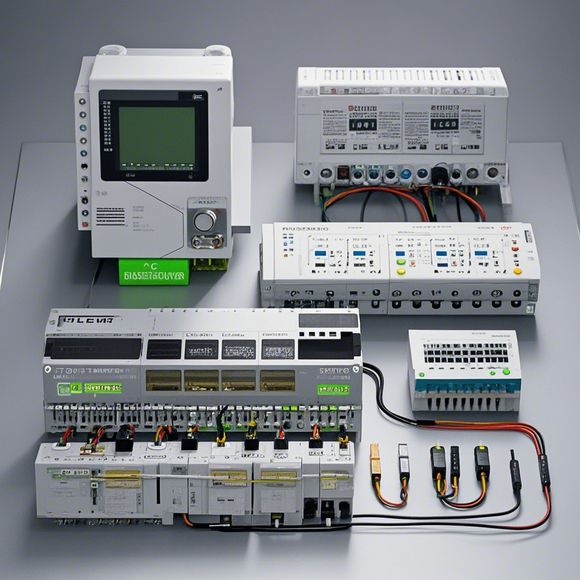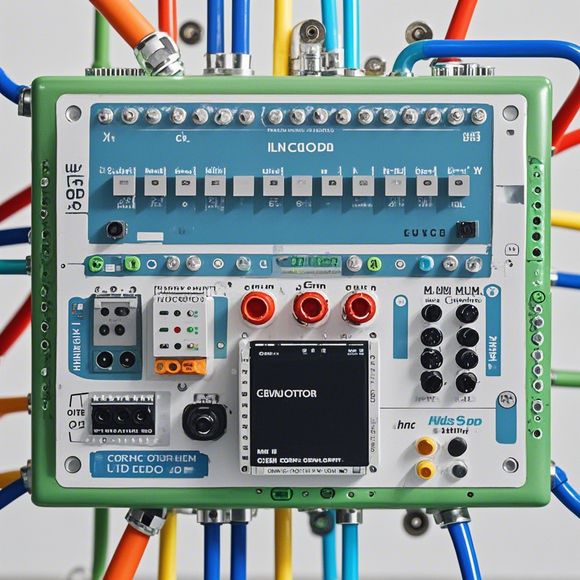PLC Controllers in Modern Manufacturing: Enhancing Productivity and Efficiency
In today's global marketplace, the ability to manufacture high-quality products with unparalleled efficiency is crucial. One of the critical components that play a pivotal role in achieving this goal is the Programmable Logic Controller (PLC), which stands for Programmable Logic Controller. These controllers are designed to control various industrial processes, making them essential in modern manufacturing environments. In this essay, we will discuss the significance of PLC controllers in enhancing productivity and efficiency in modern manufacturing.

At its core, a PLC controller is an electronic device that can be programmed to perform specific tasks based on inputs from other devices or sensors. This makes it ideal for use in industries where precise control of processes is required, such as manufacturing, automation, and robotics. The PLC controller takes over many of the functions traditionally performed by human operators, making it possible to automate complex systems and streamline production lines.
One of the primary benefits of using PLC controllers in modern manufacturing is their ability to increase productivity. Thanks to the programmability of these controllers, they can handle complex tasks without requiring human intervention, resulting in faster processing times and higher output rates. This leads to increased efficiency and reduced labor costs, ultimately leading to better financial performance for businesses.
Another significant advantage of PLC controllers is their ability to improve safety. With advanced safety features built into these controllers, they can detect any potential hazards before they occur, enabling workers to operate safely and efficiently. Additionally, the ability to monitor and control equipment remotely means that there is no need for physical presence at all, further reducing risks and improving operational security.
Moreover, PLC controllers are highly versatile and can be customized to fit the specific needs of various industries and processes. They can be configured to handle a range of different tasks, from simple timing controls to complex sequencing and data processing requirements. This flexibility allows for more precise control of manufacturing processes, resulting in better product quality and consistent output.
Furthermore, PLC controllers are also cost-effective. While initial installation and setup costs may seem high, the long-term benefits of improved efficiency, productivity, and safety make these investments well worth it. Additionally, as technology advances, the functionality and capabilities of PLC controllers continue to evolve, ensuring that businesses remain competitive in an ever-changing market.
However, while PLC controllers offer numerous benefits, their integration into existing production systems can pose some challenges. It is important to consider the complexity of the system and choose appropriate PLC models that are compatible with existing hardware and software architectures. Additionally, proper training and support should be provided to ensure that PLC controllers are used effectively and efficiently.
In conclusion, PLC controllers are critical components in modern manufacturing environments. Their ability to increase productivity, improve safety, and enhance versatility make them a valuable tool for businesses operating in industries such as automotive, aerospace, and electronics. As technological advancements continue to shape the future of manufacturing, it is clear that PLC controllers will play an increasingly important role in shaping the landscape of modern industry. By investing in the right PLC controllers and ensuring proper integration into existing production systems, businesses can unlock new levels of efficiency and profitability, positioning themselves for success in a rapidly changing marketplace.
Content expansion reading:
Content:

Hey there, let's talk about PLC controllers – these bad boys are the brains behind a lot of the automation we see in modern manufacturing. PLC stands for Programmable Logic Controller, and they're like the Swiss Army knife of the industrial world. They can handle a ton of different tasks, from simple on/off control to complex operations that require a lot of decision-making.
So, what exactly do PLC controllers do? Well, they're basically the go-between for the machines and the operators. They take input from sensors and switches, and use that information to make decisions. Based on those decisions, they'll output signals to control the operation of the machinery. It's like they're the middleman that makes sure everything runs smoothly and efficiently.
PLCs are super versatile and can be programmed to handle a wide range of tasks. For example, they might control the temperature in a factory, monitor the level of a tank, or even coordinate the movements of a robotic arm. They're like the conductor of an orchestra, making sure all the different parts of a manufacturing process are in sync.
One of the biggest advantages of PLC controllers is their ability to handle multiple tasks simultaneously. They can juggle a bunch of different inputs and outputs, which is crucial in high-speed production environments where everything needs to happen in a split second.
PLCs are also really good at dealing with variables. They can adjust to changes in the process or respond to unexpected events, which is important for keeping the manufacturing line running smoothly. For instance, if a machine stops working, a PLC can detect the issue and either alert an operator or try to fix the problem automatically.
Another cool thing about PLCs is that they're designed to be really reliable. They can operate in harsh industrial environments and are built to withstand shocks, vibrations, and extreme temperatures. Plus, they're generally very robust and can handle a lot of wear and tear.
In terms of programming, PLCs use a variety of languages, but ladder logic is one of the most common. It's designed to be easy to understand for electricians and technicians who might not have a computer science background. This makes it simpler to program and troubleshoot if something goes wrong.
Overall, PLC controllers are a fundamental part of modern manufacturing. They're what allows us to automate complex processes, improve efficiency, and ensure that products are made consistently and accurately. Without them, the manufacturing world would be a lot less sophisticated and a lot less productive. So, the next time you see a PLC in action, you'll know it's not just a box of circuits – it's the heart of the operation.
Articles related to the knowledge points of this article:
PLC Controller for Manufacturing Automation
The cost of a PLC Controller: A Comprehensive Analysis
PLC Programming for Automation Control in the Manufacturing Industry
Connecting a PLC Controller to Your Computer
PLC Controllers: A Comprehensive Guide to Understanding Their Prices